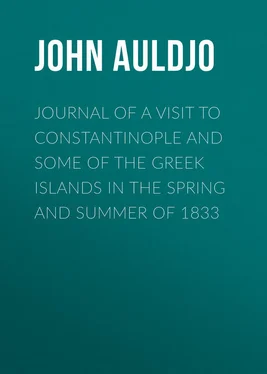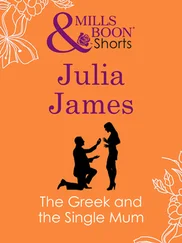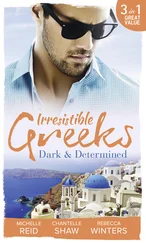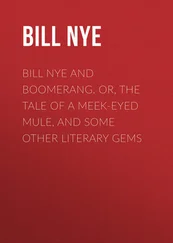John Auldjo - Journal of a Visit to Constantinople and Some of the Greek Islands in the Spring and Summer of 1833
Здесь есть возможность читать онлайн «John Auldjo - Journal of a Visit to Constantinople and Some of the Greek Islands in the Spring and Summer of 1833» — ознакомительный отрывок электронной книги совершенно бесплатно, а после прочтения отрывка купить полную версию. В некоторых случаях можно слушать аудио, скачать через торрент в формате fb2 и присутствует краткое содержание. ISBN: , Жанр: foreign_antique, foreign_prose, Путешествия и география, на английском языке. Описание произведения, (предисловие) а так же отзывы посетителей доступны на портале библиотеки ЛибКат.
- Название:Journal of a Visit to Constantinople and Some of the Greek Islands in the Spring and Summer of 1833
- Автор:
- Жанр:
- Год:неизвестен
- ISBN:http://www.gutenberg.org/ebooks/27484
- Рейтинг книги:3 / 5. Голосов: 1
-
Избранное:Добавить в избранное
- Отзывы:
-
Ваша оценка:
- 60
- 1
- 2
- 3
- 4
- 5
Journal of a Visit to Constantinople and Some of the Greek Islands in the Spring and Summer of 1833: краткое содержание, описание и аннотация
Предлагаем к чтению аннотацию, описание, краткое содержание или предисловие (зависит от того, что написал сам автор книги «Journal of a Visit to Constantinople and Some of the Greek Islands in the Spring and Summer of 1833»). Если вы не нашли необходимую информацию о книге — напишите в комментариях, мы постараемся отыскать её.
Journal of a Visit to Constantinople and Some of the Greek Islands in the Spring and Summer of 1833 — читать онлайн ознакомительный отрывок
Ниже представлен текст книги, разбитый по страницам. Система сохранения места последней прочитанной страницы, позволяет с удобством читать онлайн бесплатно книгу «Journal of a Visit to Constantinople and Some of the Greek Islands in the Spring and Summer of 1833», без необходимости каждый раз заново искать на чём Вы остановились. Поставьте закладку, и сможете в любой момент перейти на страницу, на которой закончили чтение.
Интервал:
Закладка:
LANDING OF THE AMBASSADOR. At two o'clock the ambassador landed in state: the yards were manned, and the salute fired. Soon after, the rest of the suite followed; and the Actæon was now left to quiet and regular duty. The cabins fitted up for the party were cleared away in the course of an hour; and before the dinner drum beat, the main deck had been again restored to its just proportions. In the evening, my companion and self also left the ship, and went down to Pera, to establish ourselves for the present in the house of Master Tongo; a name by which I find our landlord is better known than by that of Vitali.
Sunday, 5th. – On looking out of window into the street this morning, I beheld crowds of Armenian and Greek women proceeding to church, the former wearing the gashmak, or veil, and their long dark feridges, or cloaks, with red morocco slippers just peeping out beneath. They differ from the Turkish women only in not covering the nose, and having red instead of yellow slippers, in which they shuffle along slowly to their worship. Of the Greeks, however, some wore over their hair embroidered handkerchiefs, arranged à la Française in the shape of a toque; others were muffled in cloaks of a snuff-brown colour, with a white muslin veil arranged upon the back of the head, and having both ends brought round upon the breast: thus exposing the whole face, and setting off to the best advantage the handsome regular features, and the dark eye, with its long black silky lash.
VISIT TO THE BAZAARS. After breakfast, a party was made to visit the bazaars; and we embarked at the new custom-house stairs, in Galata, where numbers of caiques lie ready for hire, and where the same scramble occurs for passengers as at Blackfriars or Tower Stairs in England. We glided rapidly across, skilfully avoiding the numerous caiques that were plying in a contrary direction, the boatman calling out, "On the European side," – "On the Asiatic side," as it suited his purpose to pass to the right or left, there appearing to be no established law for regulating their motions.
On landing at the Balouk 9 9 Balouk , a fish in Turkish.
, or fish bazaar, we passed through the bazaar of drugs, called also that of Alexandria, an extensive covered building, where rhubarb, paints, senna, and other commodities of that sort, are sold in stalls fitted up on both sides of the passage. The articles are all exposed in the most tempting manner, according to the fancy of the vendor, who sits cross-legged on the shop-board behind, waiting anxiously for his customer; and when any one stops but for an instant, he pops out his head like a spider, to ascertain whether it is a bite or not. We passed through the pipe-stick bazaar, situated in an open street: on one side of which, pipe-sticks and amber mouth-pieces are exposed to sale; the other being almost entirely occupied by turners, who work with extraordinary neatness, considering the imperfect nature of their tools. From the bazaar where cotton handkerchiefs and shawls, English and German, are sold, we passed to the shop of Mustapha, the scent dealer, where we established ourselves for a luncheon, consisting of pipes, coffee, and lemonade, while the various bottles of perfume, – viz. attar of roses and jasmine, musk, musk rat-tails, lemon essence, sandal wood, pastilles, dyes, all the sweet odours that form part and parcel of a sultana's toilet, were temptingly exposed to our view. From time to time, portions of these delicacies were rubbed on our whiskers, hands, and lips, to induce us to purchase; so that when we left the shop to return to Pera, we were a walking bouquet of millefleurs , and might have been scented a mile off. After visiting the dockyard, where a line of battle ship and two frigates were getting ready for sea, we climbed the hill of Pera, under the shade of the dark and splendid cypress trees covering the burial ground, and from which long avenues lead to various parts of the town. PUBLIC PROMENADES.These are the favourite walks of the Perotes; and the gay dresses of the ladies, who, in joyous parties, ramble along the silent and gloomy pathways, contrast oddly with the sad and mournful character of this place of tombs. We again strolled about in this ground after dinner; but were soon tired, the cold being too severe to be pleasant; and even the inhabitants retire early. The evenings at Pera are not agreeable, there being no public amusements into which one can enter; and society is so garbled with form and etiquette, that it is hardly worth seeking; smoking, therefore, is the only resource, and most people adopt it.
Monday, 6th. – This morning we landed at the Lemon Skalese, where the fruit bazaar stands. Here were shops full of Smyrna figs, dried dates, plums, and various other fruits; with cheese, and Russian butter.PIPE-STICK BAZAAR. We went thence through the place where wax candles are sold, to the pipe-stick bazaar, where I intended to be a purchaser both of amber and cherry sticks. Of the former there are two sorts: the white, creamy, or lemon-coloured amber is the most valuable; and a large mouth-piece of the very purest is sometimes worth 5000 or 6000 piastres, equal to about 50 l. or 60 l. sterling. The second or yellow kind, being more common, is comparatively little esteemed, for the perfection of this article consists in its being free from flaws, cracks, or spots; and if the tube of wood can be seen through the amber, it is considered as very inferior in a Turk's estimation. There is a third sort, which is valueless from its transparency. It is either real or factitious, and often consists merely of the scrapings and refuse morsels, melted into lumps, and manufactured into cheap mouth-pieces. This portion of the Turkish pipe is frequently adorned with precious stones, enamelling, or carved wood, according to the fancy of the purchaser. The cost of those generally exposed for sale varies from 20 to 1500 piastres, and when one of a higher price is required, it is found in the possession of some wealthy Turkish or Armenian merchant. The amber is imported from Dantzic in lumps; there is considerable risk in the purchase of the crude article, and hence arises its excessive dearness when it turns out well. The cherry sticks come from Persia by Trebisond; they are brought to Constantinople in pieces of about two feet long; and after being set straight, are dressed and polished with infinite care. They are united into sticks generally of five or six feet, though some are as long as twelve feet, and the junction is so skilfully concealed with the bark, that in a well-made pipe it is impossible to discover it. When repolished, they are ready for sale, being left unbored until the merchant has found a purchaser. From 30 to 100 piastres is the usual price demanded, but it differs according to the length, size, and fineness of the bark; and dark-coloured sticks are preferred to those which are lighter. Pipe-sticks are also made of rose-tree and other woods; but the favourite summer pipe is of jasmine, which is not so dear as the cherry, and is very light and flexible. I have seen them of one entire piece, measuring ten feet. These are cleaned by squeezing lemon juice through them, which is also rubbed over the outside to render them cool. Another species of pipe is the narghilé or water pipe; our sailors have christened it the hubble-bubble: it is a species of hookah, consisting of a glass bowl partly filled with water, a pipe holder fitted into its taper neck, and a long flexible tube, made of embossed leather and brass wire, through which the smoke is drawn. The bowls are manufactured of clay in various forms; some being very plain, others really elegant, with abundance of gilding and ornament. TURKISH TOBACCO.The tobacco smoked in the ordinary pipe, is brought from the Crimea, Salonica, Latakia, Ormus, and other parts of the East. The Salonica tobacco is mild and excellent; that from Latakia, on the contrary, is strong and dark coloured. The price varies between four and ten piastres the oke, of two pounds and three quarters English; it is also sold in bales of ten okes each, at the same rate. The tobacco smoked in the narghilé is of a different quality and cut: the best comes from Shiraz, and it is damped previously to being put into the clay bowl. The mode of using the narghilé is not only difficult to acquire, but, to a beginner, is painful and sickening; the air being exhaled from the lungs, and replaced by the smoke and breath. Every Turk, and indeed every inhabitant of Stamboul, carries about his person a square bag, either of cachemire ornamented with embroidery, or of common silk, in which he keeps a supply of tobacco; and as the coffee-house supplies him with a pipe-stick and pipe gratis, he pays only for the cup of coffee which accompanies it. He loads his pipe from his own bag, and the boy of the establishment places a small bit of lighted charcoal on it. They may be seen by hundreds before every coffee-shop, seated on low stools, blowing clouds, sipping Mocha juice, and exhibiting the most solemn taciturnity and perfect content. In driving bargains, the Turk, having seated the purchaser at his side, presents him with coffee and a pipe, and between the puffs of smoke the negotiation is carried on. If it does not succeed, the pipe is resigned, thanks are returned for the coffee, and the business is at an end; should they agree, another pipe generally concludes the affair.
Читать дальшеИнтервал:
Закладка:
Похожие книги на «Journal of a Visit to Constantinople and Some of the Greek Islands in the Spring and Summer of 1833»
Представляем Вашему вниманию похожие книги на «Journal of a Visit to Constantinople and Some of the Greek Islands in the Spring and Summer of 1833» списком для выбора. Мы отобрали схожую по названию и смыслу литературу в надежде предоставить читателям больше вариантов отыскать новые, интересные, ещё непрочитанные произведения.
Обсуждение, отзывы о книге «Journal of a Visit to Constantinople and Some of the Greek Islands in the Spring and Summer of 1833» и просто собственные мнения читателей. Оставьте ваши комментарии, напишите, что Вы думаете о произведении, его смысле или главных героях. Укажите что конкретно понравилось, а что нет, и почему Вы так считаете.










![John Bruce - The Lettsomian Lectures on Diseases and Disorders of the Heart and Arteries in Middle and Advanced Life [1900-1901]](/books/749387/john-bruce-the-lettsomian-lectures-on-diseases-and-disorders-of-the-heart-and-arteries-in-middle-and-advanced-life-1900-1901-thumb.webp)

